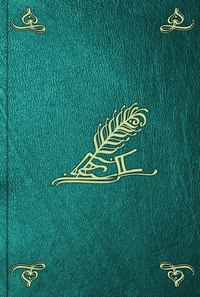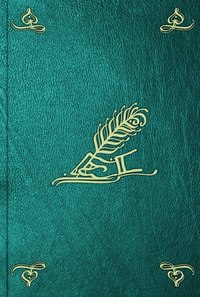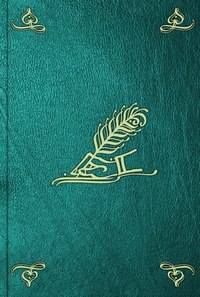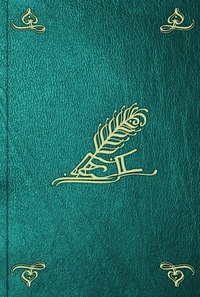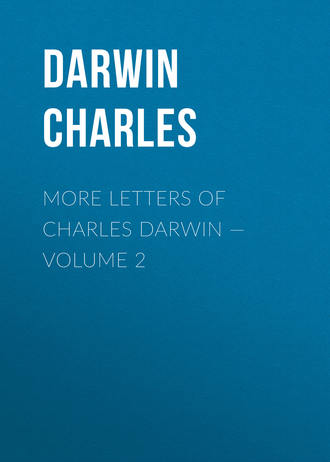 полная версия
полная версияMore Letters of Charles Darwin — Volume 2
I am very much obliged for the extracts about the "drumming," which will be of real use to me.
I do not at all know what to think of your extraordinary case of the Cicadas. Professor Asa Gray and Dr. Hooker were staying here, and I told them of the facts. They thought that the 13-year and the 17-year forms ought not to be ranked as distinct species, unless other differences besides the period of development could be discovered. They thought the mere rarity of variability in such a point was not sufficient, and I think I concur with them. The fact of both the forms presenting the same case of dimorphism is very curious. I have long wished that some one would dissect the forms of the male stag-beetle with smaller mandibles, and see if they were well developed, i.e., whether there was an abundance of spermatozoa; and the same observations ought, I think, to be made on the rarer form of your Cicada. Could you not get some observer, such as Dr. Hartman (453/2. Mr. Walsh sent Mr. Darwin an extract from Dr. Hartman's "Journal of the doings of a Cicada septendecim," in which the females are described as flocking round the drumming males. "Descent of Man" (1901), page 433.), to note whether the females flocked in equal numbers to the "drumming" of the rarer form as to the common form? You have a very curious and perplexing subject of investigation, and I wish you success in your work.
LETTER 454. TO A.R. WALLACE. Down, June 15th {1869?}.
You must not suppose from my delay that I have not been much interested by your long letter. I write now merely to thank you, and just to say that probably you are right on all the points you touch on, except, as I think, about sexual selection, which I will not give up. My belief in it, however, is contingent on my general belief in sexual selection. It is an awful stretcher to believe that a peacock's tail was thus formed; but, believing it, I believe in the same principle somewhat modified applied to man.
LETTER 455. TO G.H.K. THWAITES. Down, February 13th {N.D.}
I wrote a little time ago asking you an odd question about elephants, and now I am going to ask you an odder. I hope that you will not think me an intolerable bore. It is most improbable that you could get me an answer, but I ask on mere chance. Macacus silenus (455/1. Macacus silenus L., an Indian ape.) has a great mane of hair round neck, and passing into large whiskers and beard. Now what I want most especially to know is whether these monkeys, when they fight in confinement (and I have seen it stated that they are sometimes kept in confinement), are protected from bites by this mane and beard. Any one who watched them fighting would, I think, be able to judge on this head. My object is to find out with various animals how far the mane is of any use, or a mere ornament. Is the male Macacus silenus furnished with longer hair than the female about the neck and face? As I said, it is a hundred or a thousand to one against your finding out any one who has kept these monkeys in confinement.
LETTER 456. TO F. MULLER. Down, August 28th {1870}.
I have to thank you very sincerely for two letters: one of April 25th, containing a very curious account of the structure and morphology of Bonatea. I feel that it is quite a sin that your letters should not all be published! but, in truth, I have no spare strength to undertake any extra work, which, though slight, would follow from seeing your letters in English through the press — not but that you write almost as clearly as any Englishman. This same letter also contained some seeds for Mr. Farrer, which he was very glad to receive.
Your second letter, of July 5th, was chiefly devoted to mimicry in lepidoptera: many of your remarks seem to me so good, that I have forwarded your letter to Mr. Bates; but he is out of London having his summer holiday, and I have not yet heard from him. Your remark about imitators and imitated being of such different sizes, and the lower surface of the wings not being altered in colour, strike me as the most curious points. I should not be at all surprised if your suggestion about sexual selection were to prove true; but it seems rather too speculative to be introduced in my book, more especially as my book is already far too speculative. The very same difficulty about brightly coloured caterpillars had occurred to me, and you will see in my book what, I believe, is the true explanation from Wallace. The same view probably applies in part to gaudy butterflies. My MS. is sent to the printers, and, I suppose, will be published in about three months: of course I will send you a copy. By the way, I settled with Murray recently with respect to your book (456/1. The translation of "Fur Darwin," published in 1869.), and had to pay him only 21 pounds 2 shillings 3 pence, which I consider a very small price for the dissemination of your views; he has 547 copies as yet unsold. This most terrible war will stop all science in France and Germany for a long time. I have heard from nobody in Germany, and know not whether your brother, Hackel, Gegenbaur, Victor Carus, or my other friends are serving in the army. Dohrn has joined a cavalry regiment. I have not yet met a soul in England who does not rejoice in the splendid triumph of Germany over France (456/2. See Letter 239, Volume I.): it is a most just retribution against that vainglorious, war-liking nation. As the posts are all in confusion, I will not send this letter through France. The Editor has sent me duplicate copies of the "Revue des Cours Scientifiques," which contain several articles about my views; so I send you copies for the chance of your liking to see them.
LETTER 457. A.R. WALLACE TO CHARLES DARWIN. Holly House, Barking, E., January 27th, 1871.
Many thanks for your first volume (457/1. "The Descent of Man".), which I have just finished reading through with the greatest pleasure and interest; and I have also to thank you for the great tenderness with which you have treated me and my heresies.
On the subject of "sexual selection" and "protection," you do not yet convince me that I am wrong; but I expect your heaviest artillery will be brought up in your second volume, and I may have to capitulate. You seem, however, to have somewhat misunderstood my exact meaning, and I do not think the difference between us is quite so great as you seem to think it. There are a number of passages in which you argue against the view that the female has in any large number of cases been "specially modified" for protection, or that colour has generally been obtained by either sex for purposes of protection. But my view is, as I thought I had made it clear, that the female has (in most cases) been simply prevented from acquiring the gay tints of the male (even when there was a tendency for her to inherit it), because it was hurtful; and that, when protection is not needed, gay colours are so generally acquired by both sexes as to show that inheritance by both sexes of colour variations is the most usual, when not prevented from acting by Natural Selection. The colour itself may be acquired either by sexual selection or by other unknown causes.
There are, however, difficulties in the very wide application you give to sexual selection which at present stagger me, though no one was or is more ready than myself to admit the perfect truth of the principle or the immense importance and great variety of its applications.
Your chapters on "Man" are of intense interest — but as touching my special heresy, not as yet altogether convincing, though, of course, I fully agree with every word and every argument which goes to prove the "evolution" or "development" of man out of a lower form. My ONLY difficulties are, as to whether you have accounted for EVERY STEP of the development by ascertained laws.
I feel sure that the book will keep up and increase your high reputation, and be immensely successful, as it deserves to be...
LETTER 458. TO G.B. MURDOCH. Down, March 13th, 1871.
(458/1. We are indebted to Mr. Murdoch for a draft of his letter dated March 10th, 1871. It is too long to be quoted at length; the following citations give some idea of its contents: "In your 'Descent of Man,' in treating of the external differences between males and females of the same variety, have you attached sufficient importance to the different amount and kind of energy expended by them in reproduction?" Mr. Murdoch sums up: "Is it wrong, then, to suppose that extra growth, complicated structure, and activity in one sex exist as escape-valves for surplus vigour, rather than to please or fight with, though they may serve these purposes and be modified by them?")
I am much obliged for your valuable letter. I am strongly inclined to think that I have made a great and complete oversight with respect to the subject which you discuss. I am the more surprised at this, as I remember reflecting on some points which ought to have led me to your conclusion. By an odd chance I received the day before yesterday a letter from Mr. Lowne (author of an excellent book on the anatomy of the Blow-fly) (458/2. "The Anatomy and Physiology of the Blow-fly (Musca vomitaria L.)," by B.T. Lowne. London, 1870.) with a discussion very nearly to the same effect as yours. His conclusions were drawn from studying male insects with great horns, mandibles, etc. He informs me that his paper on this subject will soon be published in the "Transact. Entomolog. Society." (458/3. "Observations on Immature Sexuality and Alternate Generation in Insects." By B.T. Lowne. "Trans. Entomolog. Soc." 1871 {Read March 6th, 1871}. "I believe that certain cutaneous appendages, as the gigantic mandibles and thoracic horns of many males, are complemental to the sexual organs; that, in point of fact, they are produced by the excess of nutriment in the male, which in the female would go to form the generative organs and ova" (loc. cit., page 197).) I am inclined to look at your and Mr. Lowne's view as specially valuable from probably throwing light on the greater variability of male than female animals, which manifestly has much bearing on sexual selection. I will keep your remarks in mind whenever a new edition of my book is demanded.
LETTER 459. TO GEORGE FRASER.
(459/1. The following letter refers to two letters to Mr. Darwin, in which Mr. Fraser pointed out that illustrations of the theory of Sexual Selection might be found amongst British butterflies and moths. Mr. Fraser, in explanation of the letters, writes: "As an altogether unknown and far from experienced naturalist, I feared to send my letters for publication without, in the first place, obtaining Mr. Darwin's approval." The information was published in "Nature," Volume III., April 20th, 1871, page 489. The article was referred to in the second edition of the "Descent of Man" (1874), pages 312, 316, 319. Mr. Fraser adds: "This is only another illustration of Mr. Darwin's great conscientiousness in acknowledging suggestions received by him from the most humble sources." (Letter from Mr. Fraser to F. Darwin, March 21, 1888.)
Down, April 14th {1871}.
I am very much obliged for your letter and the interesting facts which it contains, and which are new to me. But I am at present so much engaged with other subjects that I cannot fully consider them; and, even if I had time, I do not suppose that I should have anything to say worth printing in a scientific journal. It would obviously be absurd in me to allow a mere note of thanks from me to be printed. Whenever I have to bring out a corrected edition of my book I will well consider your remarks (which I hope that you will send to "Nature"), but the difficulty will be that my friends tell me that I have already introduced too many facts, and that I ought to prune rather than to introduce more.
LETTER 460. TO E.S. MORSE. Down, December 3rd, 1871.
I am much obliged to you for having sent me your two interesting papers, and for the kind writing on the cover. I am very glad to have my error corrected about the protective colouring of shells. (460/1. "On Adaptive Coloration of the Mollusca," "Boston Society of Natural History Proc." Volume XIV., April 5th, 1871. Mr. Morse quotes from the "Descent of Man," I., page 316, a passage to the effect that the colours of the mollusca do not in general appear to be protective. Mr. Morse goes on to give instances of protective coloration.) It is no excuse for my broad statement, but I had in my mind the species which are brightly or beautifully coloured, and I can as yet hardly think that the colouring in such cases is protective.
LETTER 461. TO AUG. WEISMANN. Down, February 29th, 1872.
I am rejoiced to hear that your eyesight is somewhat better; but I fear that work with the microscope is still out of your power. I have often thought with sincere sympathy how much you must have suffered from your grand line of embryological research having been stopped. It was very good of you to use your eyes in writing to me. I have just received your essay (461/1. "Ueber der Einfluss der Isolirung auf die Artbildung": Leipzig, 1872.); but as I am now staying in London for the sake of rest, and as German is at all times very difficult to me, I shall not be able to read your essay for some little time. I am, however, very curious to learn what you have to say on isolation and on periods of variation. I thought much about isolation when I wrote in Chapter IV. on the circumstances favourable to Natural Selection. No doubt there remains an immense deal of work to do on "Artbildung." I have only opened a path for others to enter, and in the course of time to make a broad and clear high-road. I am especially glad that you are turning your attention to sexual selection. I have in this country hardly found any naturalists who agree with me on this subject, even to a moderate extent. They think it absurd that a female bird should be able to appreciate the splendid plumage of the male; but it would take much to persuade me that the peacock does not spread his gorgeous tail in the presence of the female in order to fascinate or excite her. The case, no doubt, is much more difficult with insects. I fear that you will find it difficult to experiment on diurnal lepidoptera in confinement, for I have never heard of any of these breeding in this state. (461/2. We are indebted to Mr. Bateson for the following note: "This belief does not seem to be well founded, for since Darwin's time several species of Rhopalocera (e.g. Pieris, Pararge, Caenonympha) have been successfully bred in confinement without any special difficulty; and by the use of large cages members even of strong-flying genera, such as Vanessa, have been induced to breed.") I was extremely pleased at hearing from Fritz Muller that he liked my chapter on lepidoptera in the "Descent of Man" more than any other part, excepting the chapter on morals.
LETTER 462. TO H. MULLER. Down {May, 1872}.
I have now read with the greatest interest your essay, which contains a vast amount of matter quite new to me. (462/1. "Anwendung der Darwin'schen Lehre auf Bienen," "Verhandl. d. naturhist. Vereins fur preuss. Rheinld. u. Westf." 1872. References to Muller's paper occur in the second edition of the "Descent of Man.") I really have no criticisms or suggestions to offer. The perfection of the gradation in the character of bees, especially in such important parts as the mouth-organs, was altogether unknown to me. You bring out all such facts very clearly by your comparison with the corresponding organs in the allied hymenoptera. How very curious is the case of bees and wasps having acquired, independently of inheritance from a common source, the habit of building hexagonal cells and of producing sterile workers! But I have been most interested by your discussion on secondary sexual differences; I do not suppose so full an account of such differences in any other group of animals has ever been published. It delights me to find that we have independently arrived at almost exactly the same conclusion with respect to the more important points deserving investigation in relation to sexual selection. For instance, the relative number of the two sexes, the earlier emergence of the males, the laws of inheritance, etc. What an admirable illustration you give of the transference of characters acquired by one sex — namely, that of the male of Bombus possessing the pollen-collecting apparatus. Many of your facts about the differences between male and female bees are surprisingly parallel with those which occur with birds. The reading your essay has given me great confidence in the efficacy of sexual selection, and I wanted some encouragement, as extremely few naturalists in England seem inclined to believe in it. I am, however, glad to find that Prof. Weismann has some faith in this principle.
The males of Bombus follow one remarkable habit, which I think it would interest you to investigate this coming summer, and no one could do it better than you. (462/2. Mr. Darwin's observations on this curious subject were sent to Hermann Muller, and after his death were translated and published in Krause's "Gesammelte kleinere Schriften von Charles Darwin," 1887, page 84. The male bees had certain regular lines of flight at Down, as from the end of the kitchen garden to the corner of the "sand-walk," and certain regular "buzzing places" where they stopped on the wing for a moment or two. Mr. Darwin's children remember vividly the pleasure of helping in the investigation of this habit.) I have therefore enclosed a briefly and roughly drawn-up account of this habit. Should you succeed in making any observations on this subject, and if you would like to use in any way my MS. you are perfectly welcome. I could, should you hereafter wish to make any use of the facts, give them in rather fuller detail; but I think that I have given enough.
I hope that you may long have health, leisure, and inclination to do much more work as excellent as your recent essay.
2. VIII.III. EXPRESSION, 1868-1874.
LETTER 463. TO F. MULLER. Down, January 30th {1868}.
I am very much obliged for your answers, though few in number (October 5th), about expression. I was especially glad to hear about shrugging the shoulders. You say that an old negro woman, when expressing astonishment, wonderfully resembled a Cebus when astonished; but are you sure that the Cebus opened its mouth? I ask because the Chimpanzee does not open its mouth when astonished, or when listening. (463/1. Darwin in the "Expression of the Emotions," adheres to this statement as being true of monkeys in general.) Please have the kindness to remember that I am very anxious to know whether any monkey, when screaming violently, partially or wholly closes its eyes.
LETTER 464. TO W. BOWMAN.
(464/1. The late Sir W. Bowman, the well-known surgeon, supplied a good deal of information of value to Darwin in regard to the expression of the emotions. The gorging of the eyes with blood during screaming is an important factor in the physiology of weeping, and indirectly in the obliquity of the eyebrows — a characteristic expression of suffering. See "Expression of the Emotions," pages 160 and 192.)
Down, March 30th {1868}.
I called at your house about three weeks since, and heard that you were away for the whole month, which I much regretted, as I wished to have had the pleasure of seeing you, of asking you a question, and of thanking you for your kindness to my son George. You did not quite understand the last note which I wrote to you — viz., about Bell's precise statement that the conjunctiva of an infant or young child becomes gorged with blood when the eyes are forcibly opened during a screaming fit. (464/2. Sir C. Bell's statement in his "Anatomy of Expression" (1844, page 106) is quoted in the "Expression of the Emotions," page 158.) I have carefully kept your previous note, in which you spoke doubtfully about Bell's statement. I intended in my former note only to express a wish that if, during your professional work, you were led to open the eyelids of a screaming child, you would specially observe this point about the eye showing signs of becoming gorged with blood, which interests me extremely. Could you ask any one to observe this for me in an eye-dispensary or hospital? But I now have to beg you kindly to consider one other question at any time when you have half an hour's leisure.
When a man coughs violently from choking or retches violently, even when he yawns, and when he laughs violently, tears come into the eyes. Now, in all these cases I observe that the orbicularis muscle is more or less spasmodically contracted, as also in the crying of a child. So, again, when the muscles of the abdomen contract violently in a propelling manner, and the breath is, I think, always held, as during the evacuation of a very costive man, and as (I hear) with a woman during severe labour-pains, the orbicularis contracts, and tears come into the eyes. Sir J.E. Tennant states that tears roll down the cheeks of elephants when screaming and trumpeting at first being captured; accordingly I went to the Zoological Gardens, and the keeper made two elephants trumpet, and when they did this violently the orbicularis was invariably plainly contracted. Hence I am led to conclude that there must be some relation between the contraction of this muscle and the secretion of tears. Can you tell me what this relation is? Does the orbicularis press against, and so directly stimulate, the lachrymal gland? As a slight blow on the eye causes, by reflex action, a copious effusion of tears, can the slight spasmodic contraction of the orbicularis act like a blow? This seems hardly possible. Does the same nerve which runs to the orbicularis send off fibrils to the lachrymal glands; and if so, when the order goes for the muscle to contract, is nervous force sent sympathetically at the same time to the glands? (464/3. See "Expression of the Emotions," page 169.)
I should be extremely much obliged if you {would} have the kindness to give me your opinion on this point.
LETTER 465. TO F.C. DONDERS.
(465/1. Mr. Darwin was indebted to Sir W. Bowman for an introduction to Professor Donders, whose work on Sir Charles Bell's views is quoted in the "Expression of the Emotions," pages 160-62.)
Down, June 3rd {1870?}.
I do not know how to thank you enough for the very great trouble which you have taken in writing at such length, and for your kind expressions towards me. I am particularly obliged for the abstract with respect to Sir C. Bell's views (465/2. See "Expression of the Emotions," pages 158 et seq.: Sir Charles Bell's view is that adopted by Darwin — viz. that the contraction of the muscles round the eyes counteracts the gorging of the parts during screaming, etc. The essay of Donders is, no doubt, "On the Action of the Eyelids in Determination of Blood from Expiratory Effort" in Beale's "Archives of Medicine," Volume V., 1870, page 20, which is a translation of the original in Dutch.), as I shall now proceed with some confidence; but I am intensely curious to read your essay in full when translated and published, as I hope, in the "Dublin Journal," as you speak of the weak point in the case — viz., that injuries are not known to follow from the gorging of the eye with blood. I may mention that my son and his friend at a military academy tell me that when they perform certain feats with their heads downwards their faces become purple and veins distended, and that they then feel an uncomfortable sensation in their eyes; but that as it is necessary for them to see, they cannot protect their eyes by closing the eyelids. The companions of one young man, who naturally has very prominent eyes, used to laugh at him when performing such feats, and declare that some day both eyes would start out of his head.
Your essay on the physiological and anatomical relations between the contraction of the orbicular muscles and the secretion of tears is wonderfully clear, and has interested me greatly. I had not thought about irritating substances getting into the nose during vomiting; but my clear impression is that mere retching causes tears. I will, however, try to get this point ascertained. When I reflect that in vomiting (subject to the above doubt), in violent coughing from choking, in yawning, violent laughter, in the violent downward action of the abdominal muscle...and in your very curious case of the spasms (465/3. In some cases a slight touch to the eye causes spasms of the orbicularis muscle, which may continue for so long as an hour, being accompanied by a flow of tears. See "Expression of the Emotions," page 166.) — that in all these cases the orbicular muscles are strongly and unconsciously contracted, and that at the same time tears often certainly flow, I must think that there is a connection of some kind between these phenomena; but you have clearly shown me that the nature of the relation is at present quite obscure.




